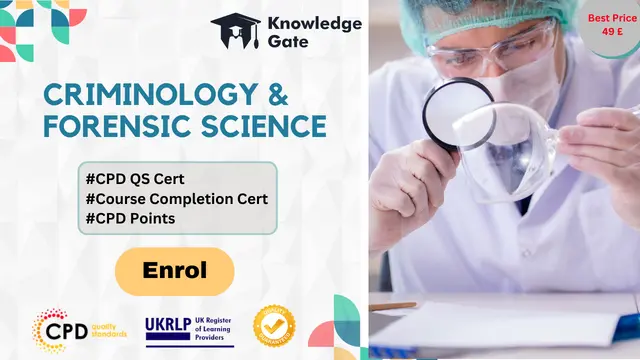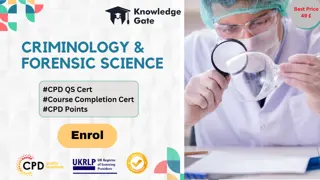
Criminology & Forensic Science
CPD Accredited>Instant Free Certificate! 5 Courses> CPDQS Certificate>Super Saver Deal
Knowledge Gate
Summary
- Reed Courses Certificate of Completion - Free
- Tutor is available to students
Add to basket or enquire
Overview
Embark on a journey through the intriguing world of Criminology and Forensic Science, a course bundle that opens the door to the mysteries of criminal behaviour and the science behind crime scene investigation. With a blend of theoretical knowledge and insights into criminal analysis, this course bundle sets the stage for an enthralling educational experience. Delve into the minds of criminals, uncover the secrets hidden in forensic evidence, and master the art of digital forensics. This course is a gateway to understanding the intricate layers of criminal justice and forensic science, offering you a unique perspective on this fascinating field. Enrol in this course to unlock a world where every clue tells a story, and every piece of evidence leads to a revelation.
Learning Outcomes
Upon completion of this Criminology & Forensic Science course bundle, you should be able to:
- Gain insights into criminal psychology and behavioural profiling.
- Develop skills in criminal investigation and evidence analysis.
- Understand the role and techniques of a criminal intelligence analyst.
- Learn the fundamentals and applications of forensic science.
- Acquire knowledge in digital forensic science and its processes.
- Enhance your analytical and critical thinking abilities in criminology.
Certificates
Reed Courses Certificate of Completion
Digital certificate - Included
Will be downloadable when all lectures have been completed.
CPD
Course media
Description
The Criminology & Forensic Science course bundle offers a comprehensive exploration into the realms of criminal investigation and forensic analysis. Learners will delve into criminology and profiling, gaining a deep understanding of criminal psychology and the factors that drive criminal behaviour. The Criminal Investigator and Criminal Intelligence Analyst courses provide a solid foundation in the methodologies and strategies used in modern criminal investigations, focusing on the analytical skills required to interpret criminal data and intelligence. In the Forensic Science course, students will explore the scientific techniques used to examine crime scenes and understand how physical evidence is collected and analysed. The Digital Forensic Science course extends this knowledge to the digital domain, teaching learners how to examine electronic devices and digital mediums for crucial forensic evidence. This curriculum is designed to provide a holistic view of the criminal justice system, from the psychology of crime to the science behind evidence collection and analysis.
This Criminology & Forensic Science course bundle Consists of the following Premium courses:
- Course 01: Criminology & Profiling Course
- Course 02: Criminal Investigator
- Course 03: Criminal Intelligence Analyst
- Course 04: Forensic Science
- Course 05: Digital Forensic Science
Who is this course for?
- Individuals interested in exploring criminology and forensic science.
- Those looking to understand criminal behaviour and profiling.
- Aspiring or current professionals in law enforcement and criminal investigation.
- Individuals with a keen interest in forensic science and technology.
- Students aiming to build a foundation in criminal intelligence analysis.
- Anyone seeking to enhance their understanding of digital forensics.
Career path
- Criminologist - Average Salary: £35,000
- Forensic Scientist - Average Salary: £30,000
- Criminal Intelligence Analyst - Average Salary: £40,000
- Digital Forensic Analyst - Average Salary: £32,000
- Crime Scene Investigator - Average Salary: £29,000
- Police Detective - Average Salary: £37,000
Questions and answers
Currently there are no Q&As for this course. Be the first to ask a question.
Reviews
Currently there are no reviews for this course. Be the first to leave a review.
Legal information
This course is advertised on reed.co.uk by the Course Provider, whose terms and conditions apply. Purchases are made directly from the Course Provider, and as such, content and materials are supplied by the Course Provider directly. Reed is acting as agent and not reseller in relation to this course. Reed's only responsibility is to facilitate your payment for the course. It is your responsibility to review and agree to the Course Provider's terms and conditions and satisfy yourself as to the suitability of the course you intend to purchase. Reed will not have any responsibility for the content of the course and/or associated materials.


